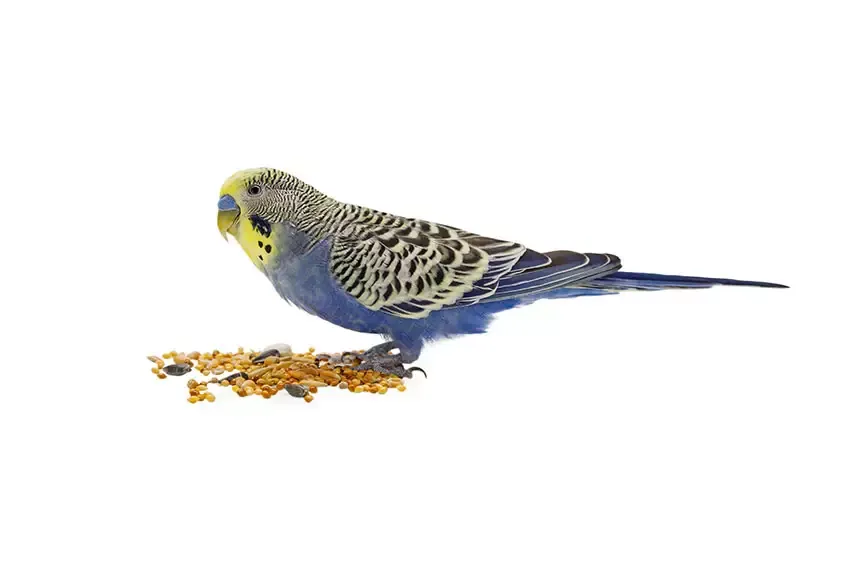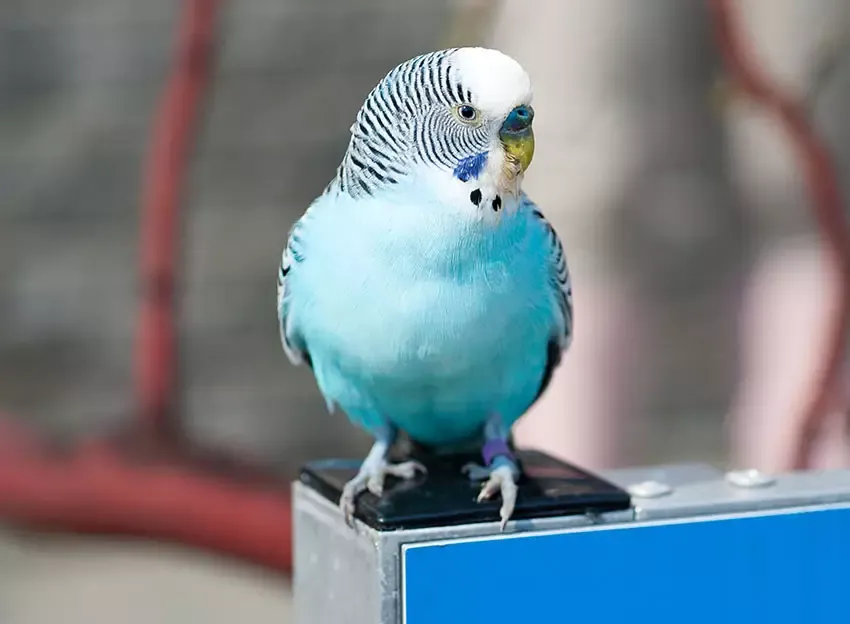Budgerigars, though hardy creatures, are susceptible to various health issues, including common colds and respiratory infections. As a devoted budgie owner, recognizing the early signs of illness and understanding the appropriate “Budgie Medicine For Cold” is paramount for their well-being. This comprehensive guide will help you identify symptoms, understand diagnostic processes, and learn about effective veterinary treatments to ensure your feathered companion’s swift recovery.
Identifying Budgie Cold Symptoms
Recognizing the signs of a cold or upper respiratory tract infection in your budgie early can make a significant difference in their prognosis. Unlike humans, budgies rarely just “get over” a cold, and what appears to be a simple sniffle can quickly escalate into a severe bacterial infection.
Keep an eye out for these key indicators:
- Unusual Respiratory Noises: The most obvious sign is sneezing or coughing. A budgie’s sneeze is distinct from its usual chirps and calls, sounding like a sudden, short expulsion of air. Any new or unusual sound from their respiratory system warrants attention.
- Nasal Discharge: You might observe a runny nose, which can lead to the cere (the fleshy part above the beak) becoming moist or caked with dried nasal discharge. This is a clear indicator of respiratory distress.
- Behavioral Changes: An ill budgie will often become listless, lethargic, and less active than usual. They may sit with ruffled feathers, appearing puffed up, as they try to conserve body heat. Spending excessive time on the bottom of the cage is another red flag.
- Breathing Difficulties: Labored breathing, panting, or stretching the neck in an effort to gasp for air are serious symptoms. Their breathing may also become noisy, sometimes described as sounding like a finger being rubbed on glass.
- Ruffled Feathers: While a general sign of illness, ruffled feathers often accompany colds as the bird tries to insulate itself.
- Appetite and Water Intake Changes: While some budgies with colds may continue to eat, pay attention to any decrease in appetite or changes in their drinking habits.
It is crucial to remember that unlike human colds, which are often viral and resolve on their own, budgie colds are frequently caused by bacteria and will not simply disappear after a few days. Prompt veterinary intervention is always necessary.
The Role of a Veterinarian in Treating Budgie Colds
Given the potential severity of budgie colds, a visit to an avian veterinarian is not just recommended, but essential. Self-diagnosis or attempting home remedies can delay proper treatment, leading to worsening conditions and potentially fatal outcomes.
Here’s why a vet’s expertise is indispensable:
- Accurate Diagnosis: A skilled avian vet can differentiate a common cold from more serious respiratory issues, such as psittacosis, fungal infections, or even allergic reactions, which can present with similar symptoms. They may take swabs of nasal discharge for bacterial culture or perform other diagnostic tests.
- Bacterial vs. Viral: Budgie colds are often bacterial in nature, requiring targeted antibiotic treatment. A vet will accurately identify the specific pathogen responsible, ensuring the correct “budgie medicine for cold” is prescribed. Attempting to treat a bacterial infection with viral remedies (or vice versa) is ineffective and dangerous.
- Prescription Medicine: Only an avian veterinarian can accurately diagnose the specific pathogen and prescribe the correct course of treatment, usually antibiotics for bacterial infections. These medications are not available over-the-counter and must be administered under veterinary guidance to ensure proper dosage and duration.
- Supportive Care Recommendations: Beyond medication, a vet will offer crucial advice on maintaining a warm, clean, and stress-free environment for your budgie during recovery. This supportive care is vital for boosting their immune system and facilitating healing.
Understanding Budgie Medicine for Cold: Treatment Approaches
When your budgie is diagnosed with a cold, the treatment plan will be tailored by your avian veterinarian based on the specific cause and severity of the infection. The focus is always on eliminating the pathogen and providing supportive care to aid recovery.
Common treatment approaches for a budgie cold include:
- Antibiotics: If a bacterial infection is confirmed, antibiotics are the primary course of treatment. These medications combat the bacteria responsible for the respiratory symptoms. They are typically administered orally, either directly by dropper or mixed into drinking water, though injections may be used in severe cases. It’s vital to complete the entire course of antibiotics, even if your budgie appears to improve, to prevent recurrence.
- Anti-inflammatories: In some cases, anti-inflammatory medications may be prescribed to reduce swelling and discomfort in the respiratory tract, making breathing easier for your bird.
- Nebulization: For more severe respiratory infections, nebulizer treatments might be recommended. This involves using a nebulizer machine to deliver fine mists of antibiotics or bronchodilators directly into the budgie’s respiratory system, allowing for targeted and effective treatment.
- Environmental Support: A crucial part of “budgie medicine for cold” involves creating an optimal healing environment. This includes ensuring a consistent, warm temperature in the cage, avoiding drafts, and sometimes increasing humidity. Providing easily accessible food and water, along with a quiet, stress-free setting, is vital for recovery.
- Isolation: If you have multiple budgies, isolating the ill bird is often recommended. This prevents the spread of the infection to other birds and allows the sick budgie to rest without competition or disturbance. Disinfecting the original cage is also important.
Other Significant Budgie Ailments and Their Treatments
While focusing on “budgie medicine for cold,” it’s also important to be aware of other common budgie ailments, as some can present with similar symptoms or exacerbate respiratory issues due to a weakened immune system.
Avian Gastric Yeast (AGY) Infection (Macrorhabdiosis/Megabacteriosis)
Also known as wasting disease, AGY is a highly contagious yeast infection caused by Macrorhabdus ornithogaster. It’s challenging to spot early.
Symptoms: Weight loss despite eating voraciously, undigested food in droppings, vomiting, and general listlessness. Secondary bacterial infections can complicate the condition.
Treatment: A veterinarian will administer specific drugs to combat the yeast and recommend a healthy diet, typically omitting sugary foodstuffs that feed the yeast. Close monitoring is crucial due to its habit of recurring.
Budgie Candidiasis
This is another yeast infection, caused by Candida, a form of thrush, that can bloom anywhere in a budgie’s digestive system.
Symptoms: Similar to AGY, including listlessness, loose droppings, and vomiting, but the vomit often has a foul smell. The crop may swell, and in advanced cases, the budgie might suffer loss of balance and shaking fits.
Treatment: Requires specific anti-fungal medications from a vet, usually for about a week. Dietary control, avoiding yeast-feeding sugars, is also essential during recovery.
 Yellow-headed budgie feeding on ground
Yellow-headed budgie feeding on ground
Caption: Candida can affect a budgie’s digestive system, often leading to distinct symptoms that require precise diagnosis and treatment by a veterinarian.
Budgie Sour Crop
This condition can have multiple causes, all typically related to yeast overgrowth.
Symptoms: A swollen crop and sour-smelling vomit.
Treatment: Requires targeted medication prescribed by a vet to eliminate the specific yeast infection.
Parrot Fever (Psittacosis)
This well-known bird-borne disease, caused by Chlamydophia psittaci, is transmittable to humans. An estimated 30% of captive budgerigars can be carriers.
Symptoms: General illness signs like listlessness, ruffled feathers, breathing problems, loose green droppings, and a gummed-up cere. Most carriers show no symptoms, spreading it via droppings and saliva.
Treatment: Vet verification and immediate isolation are critical. The bird’s cage must be thoroughly disinfected. The vet will prescribe drugs, but in severe cases, humane euthanasia might be recommended for the well-being of the flock and household. Prevention through excellent cage hygiene is paramount.
 Blue budgie perched in its cage
Blue budgie perched in its cage
Caption: Prompt isolation of an ill budgie is crucial to prevent the spread of contagious diseases like Parrot Fever to other birds in the aviary or home.
Budgerigar Fledgling Disease (Papovavirus)
Caused by the Psittacine polyomavirus, this disease primarily affects young birds, often proving fatal before they fledge. Adult birds can be carriers without showing symptoms, or in a milder form, it can cause French moult.
Treatment: There is no specific cure, so prevention through good breeding practices and hygiene is key.
Budgie Wounds
Any open wound on a budgie poses a high risk of infection and can quickly lead to septicaemia (blood poisoning), which can be fatal for such a small bird.
Symptoms: Visible blood on the bird or in the cage.
Treatment: Immediate veterinary consultation for antibiotic treatment is essential. Prevention involves ensuring the cage is free of sharp or pointed objects.
Budgie Splayed Feet
This developmental condition affects chicks.
Symptoms: The chick’s legs splay outwards, preventing proper standing.
Cause: Occurs when chicks squat on a flat nesting box floor during crucial bone development.
Treatment: Can sometimes be remedied by carefully taping the legs together between the ankle and knee for a few days, allowing some movement. However, this should only be attempted under expert guidance.
Preventing Colds and Maintaining Budgie Health
Prevention is always better than cure, especially when it comes to the delicate health of budgerigars. Maintaining an optimal environment and attentive care can significantly reduce the risk of colds and other illnesses.
- Optimal Environment: Ensure your budgie’s cage is clean, draft-free, and maintained at a consistent, comfortable temperature. Sudden temperature fluctuations can stress a bird’s system.
- Balanced Nutrition: A varied and nutritious diet, including high-quality seeds, fresh vegetables, and occasional fruits, supports a strong immune system, making your budgie more resilient to infections.
- Stress Reduction: A calm and predictable environment minimizes stress, which can suppress a bird’s immune response. Avoid loud noises, sudden movements, or constant changes in their surroundings.
- Hygiene: Regular and thorough cleaning of cages, perches, food, and water dishes is paramount. This minimizes the buildup of bacteria, yeasts, and other pathogens that can cause illness.
- Quarantine: Always isolate new birds for a period (usually 30 days) before introducing them to your existing flock. This prevents the introduction of diseases that the new bird might be carrying.
Conclusion: Prompt Action is Key for Your Budgie’s Recovery
A budgie with a cold requires immediate and accurate veterinary attention. While this guide provides comprehensive insights into “budgie medicine for cold,” remember that self-diagnosis and treatment can be dangerous and potentially lead to severe complications. Always consult a qualified avian veterinarian for any signs of illness in your budgie to ensure they receive the correct care and have the best chance for a full recovery. Your quick action and adherence to professional advice are the most important factors in safeguarding your budgie’s health and ensuring they live a long, happy, and healthy life.
